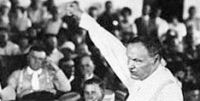John Hope Franklin: The Historian and the African American Experience
Distinguished historian and lifelong civil rights activist Professor John Hope Franklin joins archivist Allen Weinstein and Dr. Lonnie Bunch, director of the new National Museum of African-American History and Culture, to discuss his careers as educator, scholar, and activist.
To watch this interview, scroll to "John Hope Franklin," and select "Watch the Video."
